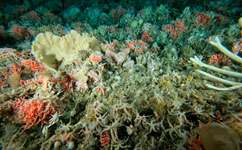Iron fertilisation would 'significantly' change deep-sea ecosystems

Adding iron to the oceans in an effort to curb growing emissions of carbon dioxide (CO2) in the atmosphere would lead to 'significant changes' in deep-sea ecosystems, the latest study suggests.
The study, led by UK researchers, found a big difference in the types and numbers of species living on the sea floor under a naturally iron-rich region of the Southern Ocean compared with a region free of iron.
The findings bring us a step closer to understanding the unintended consequences of this type of climate 'fix'.
'The type of fauna you get on the sea floor reflects what lives in the overlying water column,' explains Professor George Wolff from the University of Liverpool, a member of the research team and lead author of the study.
'So if you manipulate the oceans over the long term, you'll influence the ecosystems you get at the bottom of the sea.'
A global failure to cut CO2 emissions has led some to suggest we need a 'Plan B' to save the world from dangerous climate change. That plan would involve controversial geo-engineering projects that aim to either remove CO2 from the atmosphere, or reflect the Sun's rays away from the planet.
Adding iron to the Earth's oceans is one such geo-engineering idea. The metal encourages phytoplankton blooms, which use carbon dioxide and sunlight to grow. When these blooms die, they sink to the sea floor, taking their carbon with them, in effect locking it away for thousands of years.
Iron fertilisation is hugely controversial and a study published in 2009 came to the conclusion that it might not be as effective as first hoped: researchers found that an iron-rich region of the ocean led to only three times as much carbon being locked away compared with an iron-poor area.
But exactly how such large-scale manipulations would affect deep-sea and ocean floor ecosystems were, until now, largely unknown.
So, Wolff and colleagues from the universities of Liverpool, Aberdeen and the National Oceanography Centre set out to find out. 'We wanted to know how phytoplankton blooms at the surface of the ocean influence deep-sea fauna,' he says.
They compared deep-sea communities at two sites underneath two regions of the Southern Indian Ocean east and south of the Crozet Islands: one that is naturally fertilised by iron leached from the nearby islands, and another that's virtually iron-free. The sites are just 400 kilometres apart and both are 4200 metres deep.
Surprisingly, no one had looked at this before. 'The Southern Ocean is a remote and wild place with heavy seas, so it's a difficult place to work and is very poorly studied,' explains Wolff.
They found the material that reaches the sea floor contains much more fresh organic matter like essential fatty acids and pigments called carotenoids in the iron-rich region than at the iron-free site. They say this probably comes from the earlier spring phytoplankton bloom.
On the sea floor in the iron-rich area east of Crozet, they found a community of creatures that thrive on this organic matter, including lots of a new species of sea cucumber.
At the iron-free site, the community was very different and there were fewer animals.
'Sea cucumbers feed almost exclusively on 'freshly deposited detritus' on the sea floor, so are a good group to use to investigate the productivity of surface waters,' write the authors in their report.
'We hypothesize that artificial iron fertilisation would change deep-sea communities if carried out over a long period of time,' says Wolff. 'But it's really up to the policy-makers to make these decisions.'
Indeed, a study published by the Royal Society in 2009 came to the conclusion that, while some geo-engineering projects might be feasible, governments should focus their efforts on reducing CO2 emissions instead, because the effects of manipulating CO2 levels are far from well understood.
This story is republished courtesy of Planet Earth online, a free, companion website to the award-winning magazine Planet Earth published and funded by the Natural Environment Research Council (NERC).
More information: Wolff GA, Billett DSM, Bett BJ, Holtvoeth J, FitzGeorge-Balfour T, et al. (2011) The Effects of Natural Iron Fertilisation on Deep-Sea Ecology: The Crozet Plateau, Southern Indian Ocean. PLoS ONE 6(6): e20697. doi:10.1371/journal.pone.0020697
Provided by PlanetEarth Online
















